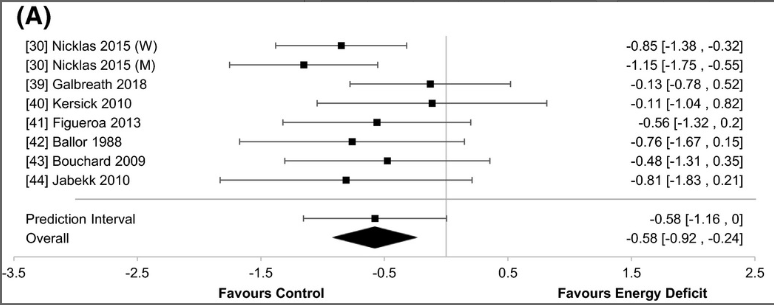Do mini-cuts cause muscle loss?
There’s a big debate regarding how fast you should lose weight. If you lose weight too slowly, you may just be wasting time. If you lose weight too fast, you’re risking losing hard-earned muscle alongside the fat you lose.
Reading time: 3-5 minutes
Take-aways
Being in a deficit reduces muscle growth, and, to a lesser extent, strength gains.
A calorie deficit doesn’t make it impossible to gain muscle/strength. This is especially true for strength.
Don’t expect to lose much strength while losing weight – or muscle for that matter.
On average, a calorie deficit of 500kcal resulted in no muscle loss.
Your deficit probably shouldn’t exceed 4-800kcal (closer to 400 for lighter, leaner individuals and closer to 800 for heavier, fatter individuals).
For muscle growth and strength gains, a slight surplus (~100-200kcal) is ideal.
A recent meta-analysis by Murphy and colleagues tried to answer a few questions:
1) How fast should you lose weight?
2) Does a calorie deficit make it harder to build muscle and strength?
Methods
To do so, the authors aggregated the results from a total of 59 studies (7 of which included a control group, whereas the remaining 52 did not).
Effects of energy balance on lean mass. “Control” was roughly at maintenance.
Being in a calorie deficit did reduce lean mass (a rough measure of muscle growth) gains by a moderate amount compared to being roughly at maintenance.
Effects of energy balance on strength. “Control” was roughly at maintenance.
With regards to strength, being in a deficit did also reduce gains, but to a lesser extent than muscle growth.
Finally, the authors combined all 59 studies and ran a meta-regression, seeking to determine the relationship between energy balance and changes in muscle mass. In short, being in a slight surplus was better than being at maintenance, which was better than being in a deficit.
Effect of energy balance on lean mass, across all studies.
Why?
Strength doesn’t seem to be impacted as negatively by a deficit as muscle growth. This is because while strength is partly influenced by how much muscle you gain, there is also a technical and neuromuscular (nervous system) component. These aspects can likely still be improved easily, even when losing weight.
If you’d like to chat about this study, feel free to comment below.
If you’re looking for an expert to handle your training and nutrition for you, check out our coaching services.




